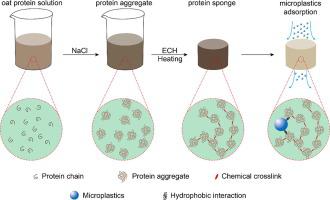Chemical Engineering Journal ( IF 13.3 ) Pub Date : 2021-02-17 , DOI: 10.1016/j.cej.2021.129006 Zhenggang Wang , Cuizhu Sun , Fengmin Li , Lingyun Chen

|
Microplastics in water environment has become a particular concern to global ecosystems and attracted wide attention in recent years. Sponge materials have been developed for efficient removal of various water pollutants including organic dyes. However, such sponge materials for microplastics removal has seldom been explored. Herein, a natural and biodegradable sponge material with high mechanical properties was fabricated from plant protein through chemical crosslinking with a compressive strength of 176 kPa and Young’s modulus of 60.1 kPa. After 100 compression cycles at compressive strain of 70%, the mechanical properties of sponge still remained up to 90%, which shows excellent fatigue-resistance close to commercial polyurethan sponges. The abundant active side chains on amino acid residues have provided the protein sponge good capacity to adsorb microplastics (removal efficiency up to 81.2%) at pH range pH 6–9 with an initial microplastic concentration of 1 mg L−1, which presents the pH and MPs concentration of water systems. The adsorption kinetic study suggested that the hydrophobic interactions and the intra-particle diffusion were driving the adsorption process. The sponge possessed highly interconnected porous structure (83%), thus showed fast adsorption ability to microplastics with 38% adsorbed onto the sponge within 10 s. The entrapped water can be released from the sponge simply by squeezing for cyclic use and the fast adsorption ability was still maintained after 20 cycles. In addition, the sponge demonstrated good be biodegradability, thus avoiding secondary contamination when applied for water treatment. This research has provided new thinking of sponge material fabrication from sustainable plant protein raw materials, and the sponge showed potential to be used as a biodegradable material for microplastic removal.
中文翻译:

来自植物蛋白的抗疲劳,可重复使用和可生物降解的海绵材料,具有快速吸水能力,可去除微量塑料
水环境中的微塑料已成为全球生态系统特别关注的问题,近年来引起了广泛关注。已经开发出海绵材料以有效去除包括有机染料在内的各种水污染物。然而,很少研究用于去除微塑料的这种海绵材料。在此,由植物蛋白通过化学交联以176kPa的抗压强度和60.1kPa的杨氏模量由天然的可生物降解的海绵材料制成。在70%的压缩应变下进行100次压缩循环后,海绵的机械性能仍保持高达90%,这显示出与商用聚氨酯海绵接近的优异的耐疲劳性。-1,显示了水系统的pH值和MPs浓度。吸附动力学研究表明,疏水相互作用和颗粒内扩散驱动了吸附过程。海绵具有高度互连的多孔结构(83%),因此对微塑料表现出快速吸附能力,其中38%的海绵在10 s内被吸附到海绵上。只需挤压循环使用,即可从海绵中释放出残留的水,经过20个循环后仍保持了快速吸附能力。此外,海绵具有良好的生物降解性,因此在用于水处理时避免了二次污染。这项研究为利用可持续植物蛋白原料制造海绵材料提供了新思路,







































 京公网安备 11010802027423号
京公网安备 11010802027423号